National Brain Game Challenge Begins Today
For a $25 fee/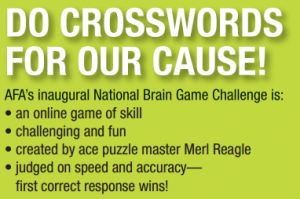 donation to the Alzheimer’s Foundation of America you can enter the National Brain Game Challenge. This is a chance to test your crossword puzzle solving abilities in an online game. There are two divisions (pro and public) with a $2500 first prize as well as other cash prizes in each division.
donation to the Alzheimer’s Foundation of America you can enter the National Brain Game Challenge. This is a chance to test your crossword puzzle solving abilities in an online game. There are two divisions (pro and public) with a $2500 first prize as well as other cash prizes in each division.
The foundation is sponsoring this contest to promote daily mental exercise as a way to help prevent the disease.
According to the website:
“Research suggests that regular mental activities might help reduce the risk of Alzheimer’s disease or other memory disorders by:
- enhancing cognitive reserve
- stimulating growth of new brain cells, and
- maintaining or strengthening connections between brain cells.”
I am interested to hear from readers that take the challenge or otherwise play crossword puzzles for fun and brain training.
Categories: Cognitive Decline, Other Tags:
New Evidence That Green Tea Boosts Brain Health
 There have been claims over the years that green tea can improve mental alertness and memory. Now a new study reports that a specific chemical in green tea supports the production of brain cells, at least in mice. This could be important for staving off age-related memory decline. More specifically:
There have been claims over the years that green tea can improve mental alertness and memory. Now a new study reports that a specific chemical in green tea supports the production of brain cells, at least in mice. This could be important for staving off age-related memory decline. More specifically:
“We proposed that EGCG can improve cognitive function by impacting the generation of neuron cells, a process known as neurogenesis,” said Bai. “We focused our research on the hippocampus, the part of the brain which processes information from short-term to long-term memory.”
Interested to hear from readers that include green tea in their Next Brain diet.
Categories: Cognitive Decline, Memory and Learning Tags:
Perception of Age Impacts Cognitive Performance
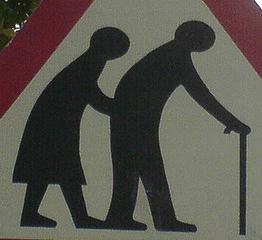 Your personal sense of age can have a dramatic (and measurable) impact on your cognitive performance. At least that is the result of recent research at the University of Exeter on a group of 60-70 year olds. Members of the group were primed to feel either older or younger, read two articles on the impact of age on cognition and then given a battery of clinical tests related to mental functioning including a dementia test. They found participants that viewed themselves as older were five times more likely to receive a dementia diagnosis. To quote:
Your personal sense of age can have a dramatic (and measurable) impact on your cognitive performance. At least that is the result of recent research at the University of Exeter on a group of 60-70 year olds. Members of the group were primed to feel either older or younger, read two articles on the impact of age on cognition and then given a battery of clinical tests related to mental functioning including a dementia test. They found participants that viewed themselves as older were five times more likely to receive a dementia diagnosis. To quote:
“Our research shows that the effect of age perceptions on performance can be dramatic, and that seeing oneself as ‘older’ significantly increases a person’s risk of being diagnosed with dementia on such tests.”
A strong result suggesting that our assumptions about age and how that impacts brain function can dramatically shape cognitive performance.
Categories: Cognitive Decline, Memory and Learning, Older Adult Tags:
Are Brain Training & Brain Fitness Being Hyped?
 There are now many software programs available that claim to be able to improve memory or otherwise enhance your cognitive performance. The idea is that you workout with the software (sometimes a game) for your brain much like you workout with exercise equipment for your body. We have reviewed several of these on the Next Brain blog and always ask the question – do they work?
There are now many software programs available that claim to be able to improve memory or otherwise enhance your cognitive performance. The idea is that you workout with the software (sometimes a game) for your brain much like you workout with exercise equipment for your body. We have reviewed several of these on the Next Brain blog and always ask the question – do they work?
Unfortunately, the answer is not clear. Scientific studies are limited or produced mixed results. But brain training is a big business, ringing up hundreds of millions of dollars in sales annually. This means advertising claims can get a bit aggressive. The editor-in-chief of Psychology World makes this point well in his recent post, The New Snake Oil: Brain Training & Brain Fitness. It is worth a read. The bottom-line is,
be wary of ads that make strong claims about improving your brain function or cognitive performance.
Good advice for any product or service!
I am interested to hear from readers that have seen ads for braining training or fitness products that are over the top in the claims they make.
Categories: Cognitive Decline, Memory and Learning, Software Tags: brain training
Exercise Once Weekly Helps Avoid Mental Decline
While the Next Brain Blog is dedicated to techniques that improve brain function and enhance cognitive performance, I get a lot of email asking about ways to protect or maintain existing brain health. Fortunately, many techniques work both ways. They will boost your brain power or simply protect what you have depending on your age and the intensity of implementation.
 Take for example a recent study led by the Mayo Clinic that looked at the role of exercise and computer use in avoiding mild cognitive impairment in older adults. A key finding:
Take for example a recent study led by the Mayo Clinic that looked at the role of exercise and computer use in avoiding mild cognitive impairment in older adults. A key finding:
“Even exercising once a week was beneficial. Most of the participants seeing the greatest benefits were exercising five to six times a week combined with computer activity,” says Geda.
The benefit in this case is avoiding age-related memory loss.
On the other hand, walking and exercise has been found to improve cognitive performance not just avoid memory loss. In one example participants had to walk at least 3 times a week for 40 minutes.
Perhaps the habits we develop to boost our intelligence will also be the habits that we need to maintain brain health as we age.
Categories: Cognitive Decline, Lifestyle, Older Adult Tags: exercise
Daily Practices for Optimal Cognitive Performance
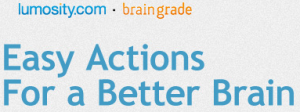 Lumosity, a well respected maker of brain training tools and games, recently shared the results of a massive (750,000 person) survey. They looked for specific daily practices that support optimal cognitive performance.
Lumosity, a well respected maker of brain training tools and games, recently shared the results of a massive (750,000 person) survey. They looked for specific daily practices that support optimal cognitive performance.
Here is what they found:
- 7 hours of sleep is much better than 5 or 10 especially when combined with the other practices.
- Exercise is key but your don’t need much. Cognitive performance peaks at about 2-3 workouts per week.
- Read at least 10 minutes everyday.
- Have 1-2 alcoholic drinks per day. Definitely avoid 3 or more.
- Play a musical instrument at least once per week.
Following these practices should improve memory and speed of mental processing.
Rarely do you see such specific advice on duration and quantity. Lumosity is able to get so specific when others are not because they have some 20 million registered users.
I am interested to hear from readers that decide to try this out.
Categories: Cognitive Decline, Diet, Lifestyle, Memory and Learning, Mental Focus, Music and Audio Tags:
Brain Health Food from the Cleveland Clinic
 The chief wellness officer from the Cleveland Clinic does a great job summarizing what we know about Food for Brain Health. He covers what to add to your diet, what to avoid and why as well as advice on other ways to stay brain healthy. While most of the food items have already been covered on the Next Brain Blog, there are a few surprises.
The chief wellness officer from the Cleveland Clinic does a great job summarizing what we know about Food for Brain Health. He covers what to add to your diet, what to avoid and why as well as advice on other ways to stay brain healthy. While most of the food items have already been covered on the Next Brain Blog, there are a few surprises.
For example, check out the list of items to the right. I bet you will find several new ones. For example, I did not know apple skins, Chia and tomatoes are health food for the brain. There is also a good discussion of things to avoid including trans fat, syrups, saturated fats and bleached flour.
We can eat to maintain brain health (avoid cognitive decline) but we can also eat to improve brain function and enhance cognitive performance. Eating the right things can make us smarter. I have cataloged over 12 examples here on the Next Brain Blog.
Interested to hear from readers that are using diet to maintain brain health or to boost brain power.
Categories: Cognitive Decline, Diet Tags:
Up Mental Processing Speed by 10% in 21 Days
 A new study from Swinburne University of Technology showed significant improvement in mental processing speed in a small group of older adults that used braining training software for 20 minutes every day for 21 days. Thirty four adults ages 53-75 years participated in the study using MyBrainTrainer software.
A new study from Swinburne University of Technology showed significant improvement in mental processing speed in a small group of older adults that used braining training software for 20 minutes every day for 21 days. Thirty four adults ages 53-75 years participated in the study using MyBrainTrainer software.
“We found an improvement in simple reaction time of about 10 per cent compared to the control group, which is quite a lot. The intervention improved speed of processing which translates to younger brain performance,”
Results were measured post-training as well as three weeks later. While this is a small study it does demonstrate a significant improvement cognitive performance.
Interested to hear from readers that use MyBrainTrainer. Does it help you think faster?
Categories: Cognitive Decline, Software, Training Tags: brain training
Use the Latest Science to Maintain Brain Health
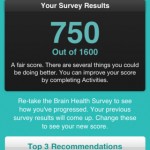 Do you have an iPhone or iPad and want to lower your risk of Alzheimer’s disease or other forms of dementia? Check out the the free BrainyApp. It let’s you apply the latest neuroscience to assess your risk and develop recommendations for keeping your brain and heart healthy.
Do you have an iPhone or iPad and want to lower your risk of Alzheimer’s disease or other forms of dementia? Check out the the free BrainyApp. It let’s you apply the latest neuroscience to assess your risk and develop recommendations for keeping your brain and heart healthy.
Not surprisingly the risk factors that the app uses are related to lifestyle and include diet, smoking, blood pressure, weight exercises and lack of mental activity. And the factors work together. For example, one study found that high salt diet combined with inactivity in older adults contributed to cognitive decline.
Interested to hear from readers that have used this app or similar apps to gain insight into how lifestyle choices impact brain health.
Categories: Cognitive Decline, Lifestyle, Older Adult, Software Tags:
Brain Health Becomes Top Economic Issue
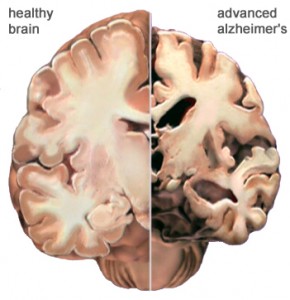 Just read an interesting blog post claiming that the cost of brain disorders in Europe has soared to $1 trillion dollars per year! The post in based on research from the European Brain Council and covers a wide range of issues from strokes and depression to sleep problems and headaches.
Just read an interesting blog post claiming that the cost of brain disorders in Europe has soared to $1 trillion dollars per year! The post in based on research from the European Brain Council and covers a wide range of issues from strokes and depression to sleep problems and headaches.
The lack of brain health is now the most costly of all chronic conditions in Europe even topping heart disease and cancer.
While the article points to tougher regulation on pharmaceutical in Europe as part of the problem, the costs are enormous in the US too.
This signals an urgent need for individual action and behavior change around diet, supplements, exercise, brain training, socializing, personal mood management and the other factors that have proven effective in enhancing and maintaining brain health even as we age.
Image Source: Alzheimer’s Association
Categories: Cognitive Decline Tags:
